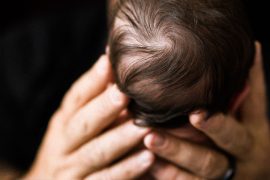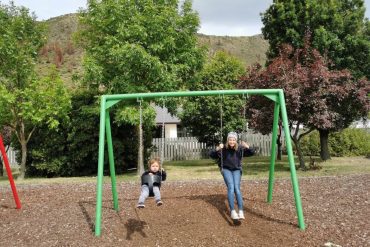Claim #7: “Working gradually towards better sleep is, in the short and long term, going to mean your baby is in fact producing less cortisol overall than a baby who continues to be overtired or sleep deprived.” This combines with earlier statements that sleep training produces less cortisol than starting daycare and being overtired.
So let’s start with the fact that we have no research comparing these outcomes. This seems to be extrapolated from different pieces of research, and unfortunately, poorly so. Research on cortisol levels in sleep training come from Middlemiss et al. (2012), research on cortisol levels in daycare come from Vermeer and van IJzendoorn (2006) and Ahnert et al. (2004), and the implication of overtired seems to come from Scher et al. (2010).
Why should we not compare across these studies? Primarily in this case, it’s to do with ages and the natural development of the cortisol circadian rhythm. For example, Scher et al. (2010) included children between the ages of 12 and 36 months, a relatively large range. However, Middlemiss et al. (2012) included infants aged 4 to 10 months and the meta-analysis from Vermeer and van IJzendoorn (2006) included nine studies, but only one included children under one year and the mean for that group was still 20 months. Given another study cited herein (de Weerth, Zijl, & Buitelaar, 2003) speaks to the fact that the development of the circadian rhythm is highly variable in the first year with lots of inter-individual variability, comparing children under 12 months to those above is highly suspect.
Furthermore, the development of the circadian rhythm actually continues to develop for a few more years so crossing studies may still be problematic.
The second issue is that we have one preliminary study (Middlemiss et al., 2012) that has even looked at cortisol during sleep training. This is a very difficult group to take as a standard, though they did find increases in cortisol during training. However, as this is the youngest group of the studies referenced and this is known to have large variability, being the comparison group is unwarranted.
But if we ignore these problems and just look at the claims that sleep training is less stressful than either daycare or being overtired, what do we have? Well, with daycare, we may want to say it’s more stressful and that the stress lasts as there is a lot of research suggesting this, especially in younger (<36 months) children. I realise that we have culturally normalised daycare, but that doesn’t mean it’s not problematic and there is also research that quantity of daycare is related to other externalising and internalising problems (you can read my summary of daycare research here), so to use this comparison to claim no problems with sleep training just doesn’t make sense.
Now to being overtired. I believe that based on what is referenced, the author is suggesting that Scher et al.’s (2010) research that found elevated morning cortisol levels were associated with fragmented sleep is an indication of overtired. However, what was not discussed is that children who had fragmented sleep also were rated as having greater “negative” temperaments or personalities. In line with findings from Gunnar and Donzella (2002), we know that infants with this temperament are more likely to have higher cortisol levels and require more support and sensitivity from caregivers.
This means that we may not be seeing anything to do with being overtired, but rather physiological levels associated with a particular temperament or children who are not receiving the type of care that is needed given their temperament.
In fact, Spangler et al. (1994), also cited in the original, speaks to the link between maternal sensitivity in the first year and increases in cortisol, with insensitive mothers having children who had higher cortisol levels all around.
***
Okay, so I hope it’s clear that the research doesn’t back up these claims as they have been stated. Of course, they also don’t support the notion that all children will be damaged beyond repair and lose attachment to caregivers and so on. It’s far more complicated and nuanced and that’s something we should never forgot.
To read more on stress and sleep training, see here.
To read more on the effects of distress on stress, see here.
To read more on the period of hyporesponsivity and the importance of caregiver responsiveness, see here.
Originally published here.
Tracy Cassels, PhD is the Director of Evolutionary Parenting, a science-based, attachment-oriented resource for families on a variety of parenting issues. In addition to her online resources, she offers one-on-one support to families around the world and is regularly asked to speak on a variety of issues from sleep to tantrums at conferences and in the media. She lives in Prince Edward County, Ontario, Canada with her husband and two children.










